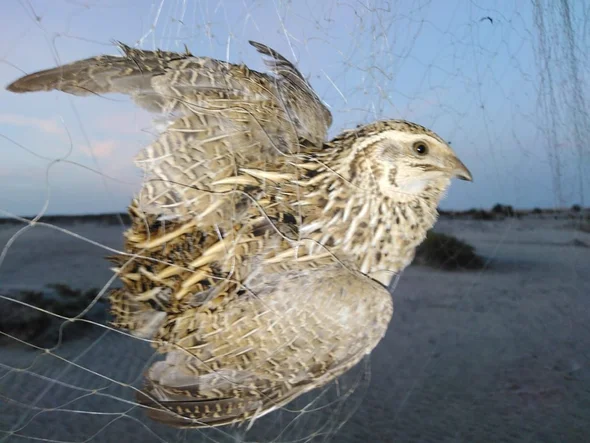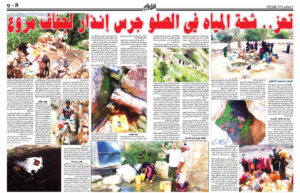Copied from a site for information published on October 2, 2022. You can refer to the original link from here
Written by Alia Abu Shahba, Muhammad Abu Leila
Current hunting practices will contribute to the extinction of migratory quail
Quail and 240 other species of migratory birds fly from Europe to Africa in September of each year. These birds pass through Egypt in search of warmth, hoping to return at the end of the season to their original homeland. In Egypt, they become a meal on the table, or frozen and prepared. For export, their numbers decrease and they become vulnerable to extinction.
Weak oversight and inspection, and their distribution among several parties, increases indiscriminate hunting and the use of legally criminalized methods against migratory songbirds, which exposes them to extinction, despite Egypt’s commitment to international agreements to preserve them, as it is the second most important route in the world for migratory birds.




In Egypt, there are 34 sites for birds coming from the continents of Europe and Asia, including 15 important areas for migratory birds within reserves in eight governorates, the most prominent of which is “Burulus Reserve.”
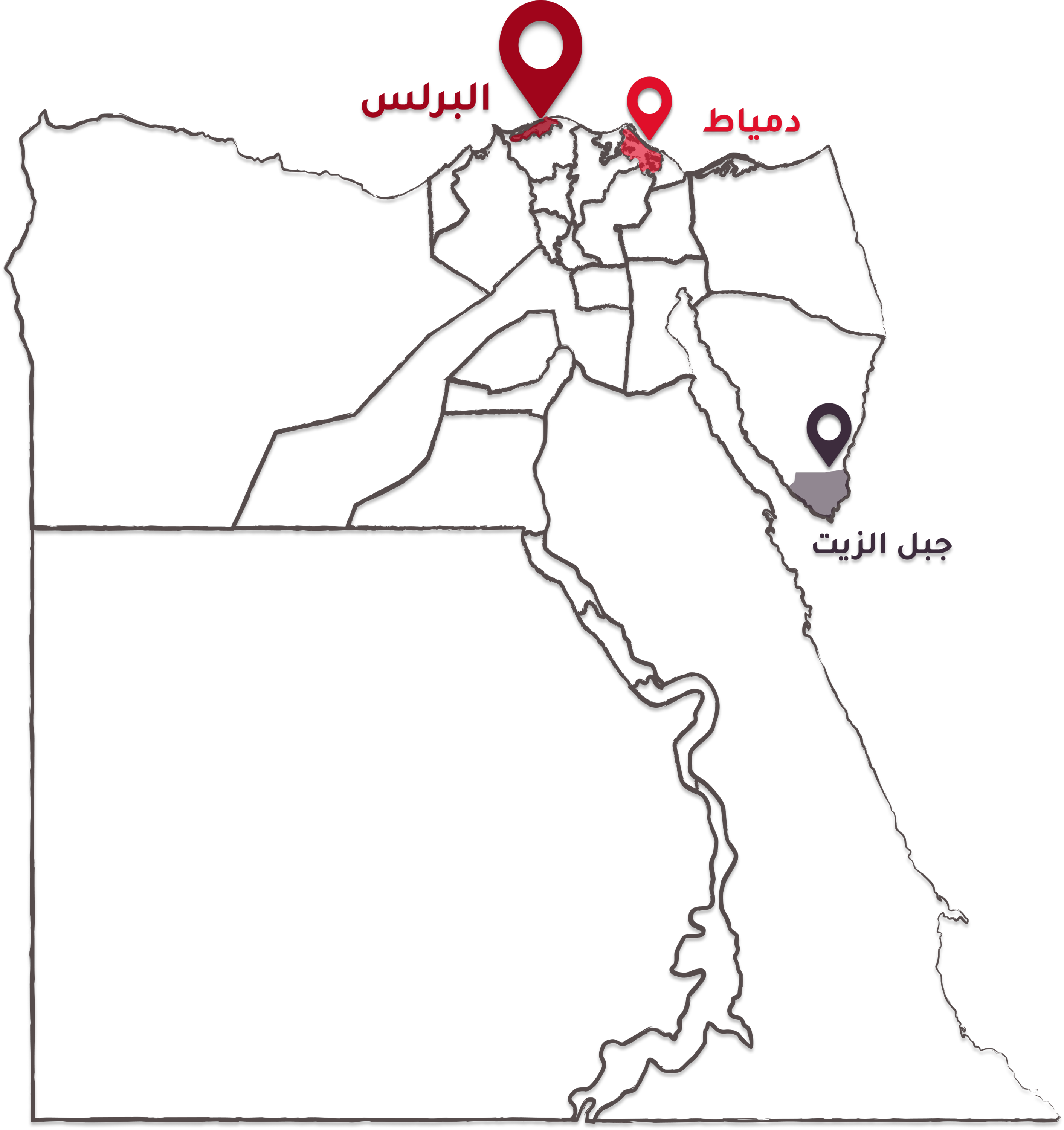
Interactive map of bird hunting sites (Burulus - Jabal Al-Zayt - Damietta)
A trip to fishing areas during migration seasons for inspection
The road from Cairo to Lake Burullus exceeds 200 kilometers, about three hours by car in a journey taken by the investigators, to reach the first bird catcher on Baltim Beach overlooking the Mediterranean Sea, and there the fishermen set their nets at a height of five meters and in more than one row, in violation of controls and requirements. Fishing with nets.
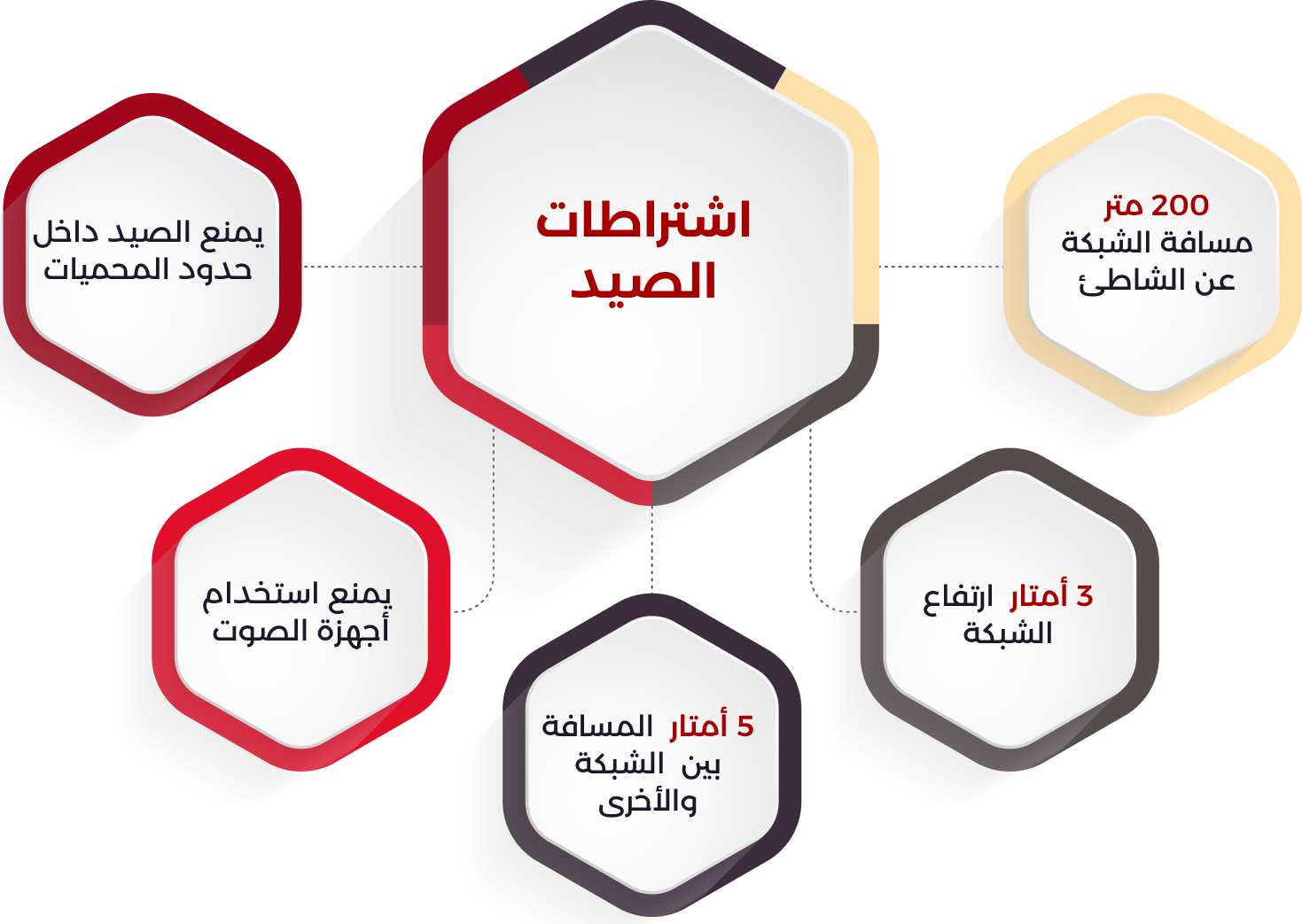
Egypt sets many conditions for hunting, including prohibiting hunting within the boundaries of reserves
Sixty-year-old Thabet Abu Zaid inherited the hobby of bird hunting from his father, and owns a plot of land of one thousand meters on the sea coast, on which he hangs his nets during the hunting season.
He obtains a permit from the Border Guard Department, pays 100 pounds (about 5 dollars) as a fee for the season, and then sets the fishing nets at a distance not exceeding 200 meters from the shore. According to Thabet, the majority of fishermen do not adhere to this distance approved by the Ministry of the Environment and published in the Official Gazette. On September 8, 2021.
Thabet Abu Zeid inherited the hobby of bird hunting from his father credit: Amal Mostafa
The annual fishing decision issued by the Ministry of Environment at the beginning of the fishing season determines the distance between the fishing nets and the seashore. It was 500 metres, and changed in 2021 to 200 metres.
The Ministry of Environment justifies the amendment by saying that the wide distance in some places was within the scope of lakes or residential areas, and thus it was difficult for birds to find an escape route.
The ministry says that it will conduct a scientific study in cooperation with the Egyptian Society for the Conservation of Nature, the local partner of Birdlife International, to determine the best distance and adjust the hunting system on a scientific basis.
Hunting with prohibited audio devices
The decision regulating the annual hunting process issued by the Ministry of Environment prohibits the use of ultrasonic devices in hunting quails and other birds that are authorized to be hunted, so hunters in this way do not obtain official permits. One of the net bird hunters and environmental specialists we met said: Hunting with sound It will contribute to the extinction of birds, including quail.
The devices imitate the sound of migratory birds, attracting the birds towards the device, so they stick to the tree covered with glue (stitched). The birds remain attached for several hours, and may die before they are collected. The bird is sold for 10 pounds (54 cents) to one of the merchants of the village of “Mastrua.”
4,000 fishermen work in the village (inhabited by 15,000 people), and from there they are sold locally, or exported to the Gulf countries as “sexual tonics and immune system boosters.”
The (Chinese-made) device emits 182 different sounds, and hundreds of other sounds can be downloaded, and although its use is prohibited, there is nothing preventing it from being purchased through electronic marketing sites, such asMazon Andon Baba, at prices ranging between 2,000 and 6,000 pounds ($107-$322).
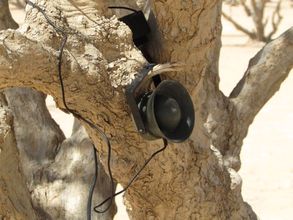
An illegal sound device attracts birds to a tree glued to a tree
The investigators went to the village of Mastrua, affiliated with the Burullus center, 48 kilometers from the coast of Baltim, searching among the alleys of small, compact houses built of white bricks for the thirty-year-old fisherman Shaalan (a pseudonym), who works in selling and maintaining audio equipment in addition to fishing.
He says that he hunts about 300 birds every day, such as quail, ducks, bulbuls, finches, and vegetables.
There, “Shaalan” offered us to buy a “falcon,” one of the rare birds that the Ministry of Environment prohibits hunting. Shaalan hunted falcons more than once, most recently in 2019, and sold them for 267 thousand pounds ($14.8 thousand), as the money was divided among 10 partners who remained with their families. In the desert for three months.
“Shaalan” works in selling and maintaining audio equipment in addition to fishing
You will not be able to go to the village of Mastrowa without passing by the house of the “Prince of Migratory Birds,” the sixty-year-old merchant, Muhammad Al-Falah, who has been working in this profession for 54 years, and describes himself as “the most important migratory bird merchant in Egypt.”
Birds are chirping inside their stacked cages hanging on the front walls of the house, and inside is a wall of pictures of the farmer with “Shaheen’s Falcons,” which he owned previously, and behind the wall is a room with large, full refrigerators for preserving birds, and a bathroom used for slaughtering and cleaning birds.
The farmer says: “There is no thing in the world called extinction. As long as God created something that will never become extinct, birds are a provision from God.”
The lizard bird, the whistling bird, the fig sparrow, and the small darter bird, are the most in demand in the Gulf countries, according to Al-Falah. The price of the lizard bird reaches 120 pounds ($6.4), and the whistling bird costs 35 pounds ($1.8).
The moonbird, the whistling bird, the fig sparrow, and the little bird are the most in demand in the Gulf countries, according to Al-Falah.
The numbers of migratory quails have decreased in the North Sinai region, where about 2.5 million birds are hunted annually, specifically on the coast of Lake Bardawil, and continuing with current hunting practices will contribute to the extinction of the migratory quail, according to study A research study prepared by Omar Atom, associate professor of biology at Indiana University, USA.

There are 1.7 million birds hunted annually in the Mediterranean region
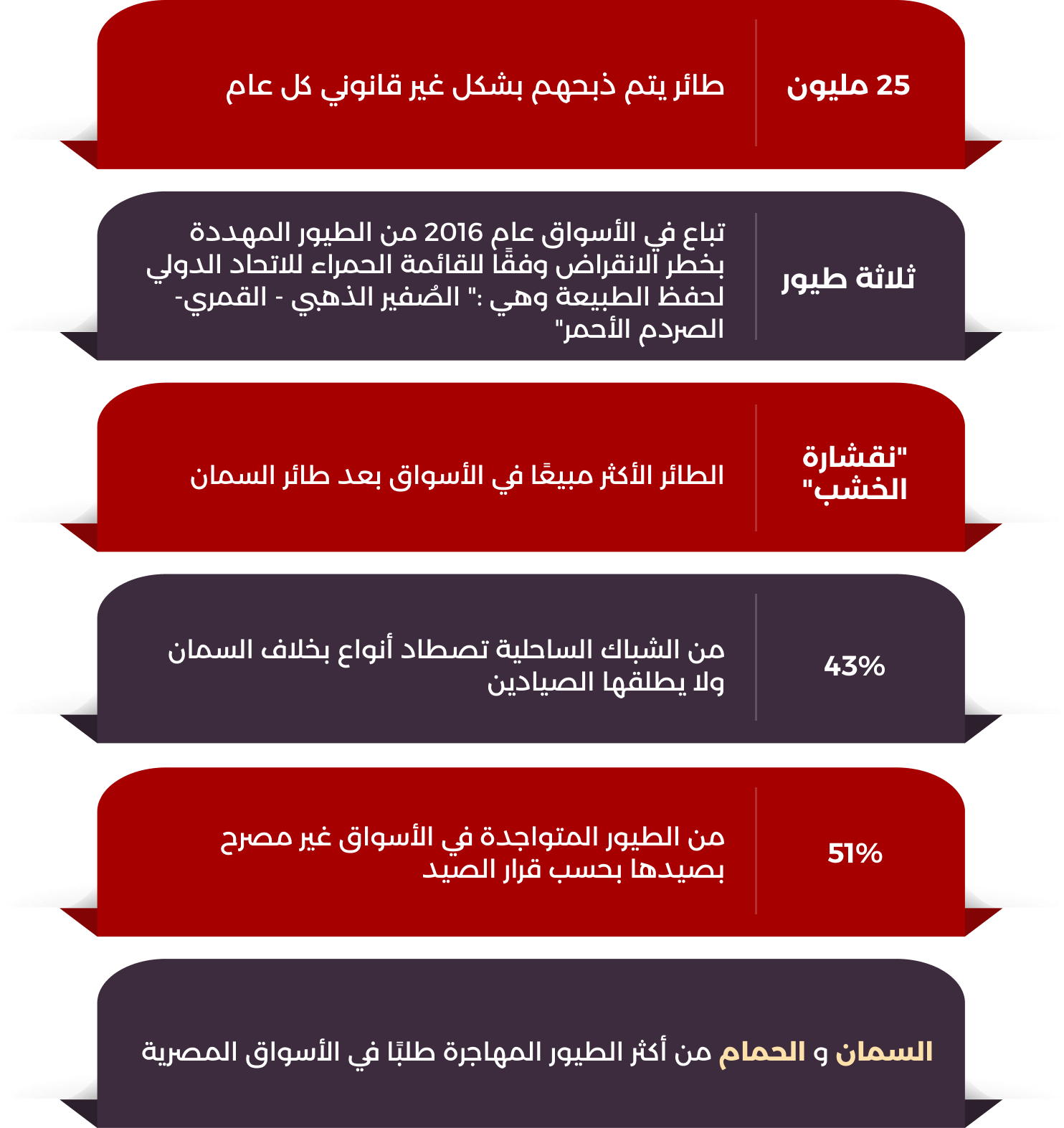
One in five bird species on the continent is headed toward extinction, and 344 native bird species have disappeared, according to Europe's latest Red List report and analysis by Bird Life International, the world's largest wildlife conservation charity. .
The Ministry of Environment allows the hunting of 21 species of migratory birds. This is justified - according to the head of the Central Department of Biodiversity in the Ministry of Environment, Ayman Hamadeh - by the fact that there are two important criteria that are taken into account when allowing the hunting of a species. The first is the status of the species in the International Union for Conservation of Nature classification of species. Threatened, and the second is the extent to which this species tolerates a certain percentage of hunting in a way that does not affect its numbers globally, and does not affect its ability to continue reproducing and maintaining its survival in nature, or has it become globally exposed to the risk of extinction, and therefore its hunting can be prevented, but the quail so far is not threatened. It is possible to fish from it to a certain extent.
Migratory bird business
In the Burullus Reserve alone, one million and 416 thousand quails are hunted in three months of hunting, with an annual return of up to 5.6 million pounds, according to a study prepared by the Ministry of Environment. The export of these birds to the Gulf countries is another reason for the increase in the intensity of hunting practices, according to the environmental researcher Founder. Egyptian Society for the Conservation of Nature, Sherif Bahaa El-Din, adding that exporting began ten years ago, by slaughtering, packaging and freezing birds, then shipping and exporting them.
Egypt resumed the export of poultry and local birds in October 2020, in accordance with requirements, the most important of which is that they must be farm birds and not migratory ones. Law No. (4) of 1994 prohibits the export, import, or trade in migratory birds, alive or dead, in whole, their parts, or their derivatives.
Salwa Al-Halawani, a researcher at Bird Life International, says: “Birds are imported for the purpose of eating frozen, which makes it difficult to know whether they are a farm bird, a migratory quail, or a songbird.”
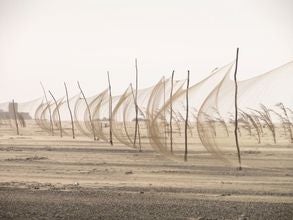
Article (28-1) of Law 4 of 1994 regarding the environment prohibits hunting, killing, or capturing birds and wild animals.
Heaven's provision
“Hunting migratory birds is our livelihood... I have no other source, and this livelihood comes to me from the sky,” is a phrase that Shaalan repeated several times during his speech, stressing that he goes out hunting in the desert with his entire family to provide for living expenses. He borrows his travel expenses for the hunting trip, in order to repay the debt. After slaughtering and selling the birds, not only Shaalan, but all the hunters we met repeated: “This is our provision from heaven.”
According to a field study prepared by the Assistant Professor in the Department of Animal Sciences at Damietta University, Basma Sheta, some families’ income depends on the hunting season, while the rest of the year they catch fish, and they consider migratory birds to be “a livelihood from heaven.” The price of ducks of all kinds (bulbous, shirshirs, and khudairi) ranges in price. ) from 200 to 250 pounds ($12-15), which is an attractive price that encourages hunting. In her view, it is difficult to convince the fisherman to reduce hunting in order to preserve biodiversity and confront the threat of extinction, without empowering him economically and intellectually.
Environmental researcher Salwa Al-Halawani prepared study Regarding the social and economic conditions of fishermen, the Ministry of Environment was angry, because it revealed the absence of the Ministry’s oversight of poaching practices, as 75% of these practices are a violation. Moreover, the study showed that the majority of fishermen receive small sums of money, with the exception of the fisherman who trades what he catches, adding The price of a songbird (small sparrows) is one pound ($0.045), and thus the profit increases as the number of birds increases, so that the average income of the hunter becomes 500 pounds per day ($26).
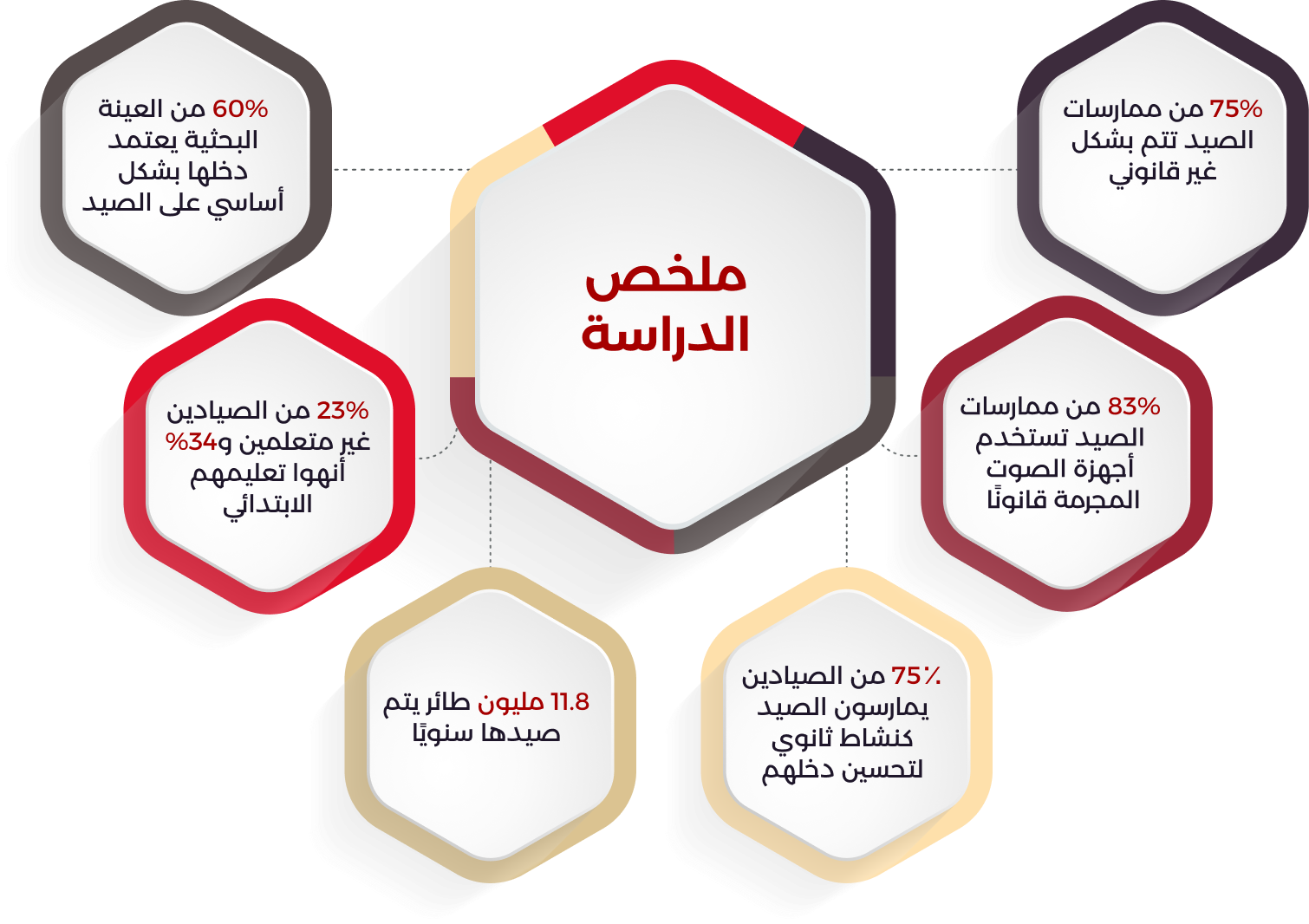
The founder of the Egyptian Society for the Conservation of Nature, Sherif Bahaa El-Din, criticizes the lack of sufficient interest from research centers in studying and monitoring hunting rates, and asserts that “the most difficult and important part in controlling the hunting system is the economic part of hunters, whose economic conditions depend mainly on birds, so it is necessary Who developed solutions that understand the economic aspects of fishermen’s lives.”
What Bahaa El-Din calls for was applied to the “Jabal El-Zeit” area on the Red Sea coast, which includes turbine stations to generate electricity from wind energy. Saber Riad, an environmental consultant and field official for one of the soaring bird hunting projects in Jebel El-Zeit, says: Some residents have entered the work system. With the associations for 5 years, they were trained to monitor the movement and movement of birds, and this provided job opportunities for a higher financial return than hunting migratory birds.
Ayman Hamadeh, head of the Central Department of Biodiversity in the Ministry of Environment, pointed out that a specialized socio-economic study was conducted on the conditions of fishermen in cooperation with a project that was funded by the European Union and the French Global Environment Facility. He said that the Ministry of Environment is in the process of announcing its results to understand the motives for hunting and social and economic needs. Therefore, “alternatives can be developed.”
Lack of control over fishing
Article 45 of the current Egyptian Constitution stipulates that the state is committed to preserving livestock and protecting those that are endangered or endangered.
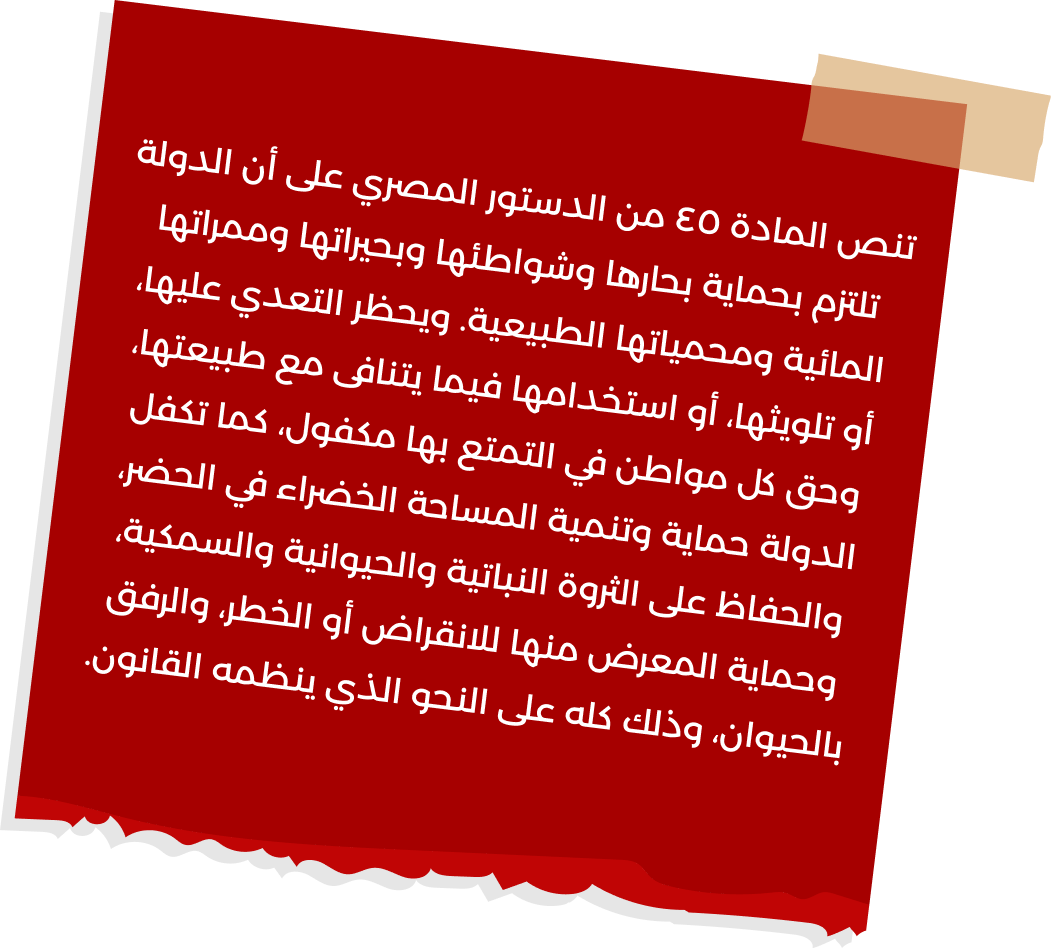
The former advisor to the Minister of the Environment for Biodiversity, Mustafa Fouda, explains that the current government efforts to control hunting operations are not sufficient at all, and that there is failure and laxity in implementing the law.
He believes that the oversight process requires a lot of capabilities in light of the presence of a small and insufficient number of employees responsible for this process.
He pointed out that the oversight system depends primarily on the responsibility of the supervisory employee and his keenness to implement the law, and that “every official fears the loss of his position, so he leaves the situation as it is without taking action.”
He points out that the oversight process is costly for the Ministry of Interior, represented by the Water Bodies and Environment Police, and that state resources are directed to specific things that do not include protecting nature or migratory birds, but at the same time he believes that “there are positive individual attempts.”
The former advisor to the Minister of the Environment for Biodiversity denounced the issuance of a ministerial decision every year to regulate hunting and the lack of a mechanism to implement it. He stressed that there are a large number of hunters who hunt migratory birds without hunting permits. These are supposed to be subject to punishment for violating hunting laws, according to Amended Law No. (9). ) for the year 2009, which increases the penalty from 500 pounds to 30,000 pounds ($1,610).
On the other hand, some fishermen sometimes commit to awareness campaigns, according to Fouda, adding: “But as usual, Rima returns to her old habit after the end of the inspection campaigns against them,” and by following up on the decisions of the Ministry of Environment announced via Data OfficialThe Ministry is only interested in combating hunting and trafficking in birds of prey, such as eagles and hawks, and has no interest in songbirds and sparrows.
Fouda believes that the solution is to create an independent sector to manage state resources and natural reserves, a project for which a law was prepared and sent to the House of Representatives and the Council of Ministers, but it was saved.
The solution, in his view, lies in the presence of complete legislation. “So that everything related to nature becomes in one place, under the name (Nature Conservation Authority), and for it to be within the bodies of the Ministry of Environment.”
The Ministry of Environment acknowledges the shortcomings in the process of following up on the implementation of hunting legislation and establishing its standards. The head of the Ministry’s Central Department of Biodiversity, Ayman Hamadeh, says: “We still suffer from a weak follow-up and control process on hunting operations due to weak capabilities, in terms of resources, which include material and human capabilities, and vehicles.” “It has the competence to reach hunting areas and monitor their conditions, and all the capabilities are insufficient, and therefore we acknowledge that there is a problem in monitoring the application of legal standards for hunting, especially since the problem of the decline in the numbers of birds, such as quail, has become noticeable and has been recognized by hunters.”
- The Ministry of Environment did not monitor any violations regarding hunting migratory birds in 2021
- 4 inspection campaigns for migratory bird hunting areas
- 14 nests of peregrine falcons were destroyed
- 20 falcons were hunted
Hamada says: The proposal to establish an economic authority to protect nature is a dream for workers in the sector that they have been seeking to achieve since the end of the nineties, and there are efforts and steps that have already been accomplished, and may be resumed again after the end of the next climate conference COP27 - scheduled for November 2022 in Sharm. The Sheikh pointed out that the sector’s transformation into a financially sustainable body with its own economic resources makes it achieve good income, enabling it to optimally perform its role in preserving biodiversity.
Bird hunting trips
In addition to hunting migratory birds as a “profession,” we monitored trips promoted on Facebook that are concerned with the “hobby” of hunting birds, and do not fall under the name of “eco-tourism.” These trips include hunting with rifles, and there is a type of cartridge that produces a lot of bullets. At the same time, it infects a large number of birds. It is prohibited, and is usually used on the northern coast from El Alamein to Salloum.
The investigation preparers continued with one of the officials in charge of migratory bird hunting trips in the Fayoum region, called “Abu Ahmed.” He said: “It is forbidden to hunt migratory birds in Lake Qarun, so people resort to creating artificial lakes (ponds) for the birds to gather around them.”
Article (15) of the Law for the Protection and Development of Lakes and Fish Resources No. (146) of 2021 prohibits the exploitation or establishment of any facilities or the conduct of any business or the exercise of any activities on the lands located within the lakes sanctuary, except with a license from the state.
Regarding migratory bird hunting trips advertised on social media sites, in addition to videos posted by hunters and traders on YouTube, Ayman Hamada says: “We have a problem with litigation procedures; “Poachers easily evade them by claiming, for example, that the account has been stolen, or that the photos are fabricated, or when moving to detect violations in reported places, the owners leave their places, and thus the Environmental Police are unable to detain them.”
Climate change on migratory birds
Egypt has signed many international agreements related to the protection of migratory birds from being exposed to the threat of extinction, the most important of which is the CITES agreement, which regulates trade in wildlife and criminalizes trafficking in species threatened with extinction, and also the agreement for the conservation of soaring birds, most notably the falcon and the Egyptian vulture.
But other than hunting, there are other factors that are destroying natural bird habitats, including climate change, according to Sherif Bahaa El-Din, founder of the Egyptian Society for the Conservation of Nature (the local partner of the World Bird Council). Through annual monitoring and follow-up of bird migration flights, the quality and numbers of birds have changed, some of which Others decreased, others increased, and other species were observed that were not present before.
This is in addition to the destruction of wetlands and lakes - such as Lakes Al-Manzala and Burullus - which have decreased in size from what they were before, and also the northern coast, which is no longer just a coastal environment, but has become an urban environment, which affects resident birds more than migratory ones, according to Bahaa’s statement. Debt.
Bahaa El-Din criticizes the lack of sufficient interest from research centers in studying and monitoring fishing rates
The Executive Director of the Egyptian Society for the Conservation of Nature, Khaled El Nouby, who is currently writing a doctoral thesis on the nature of migratory birds and their impact on climate change, agrees with him, stressing that these birds have already been affected by the lack of water resources and the increase in temperatures, which threatens their role in preserving biodiversity.
As the hunting season for migratory birds continues, the lack of control continues and is widespread among many parties, amid the steady decrease in the numbers of migratory birds and quails in particular, increasing concern that we will wake up one day to an autumn without quails.
- The investigation was carried out in cooperation with the Arab Reporters for Investigative Journalism “ARIJ” network.
Article cover image: Credit: Nature Conservation Egypt

